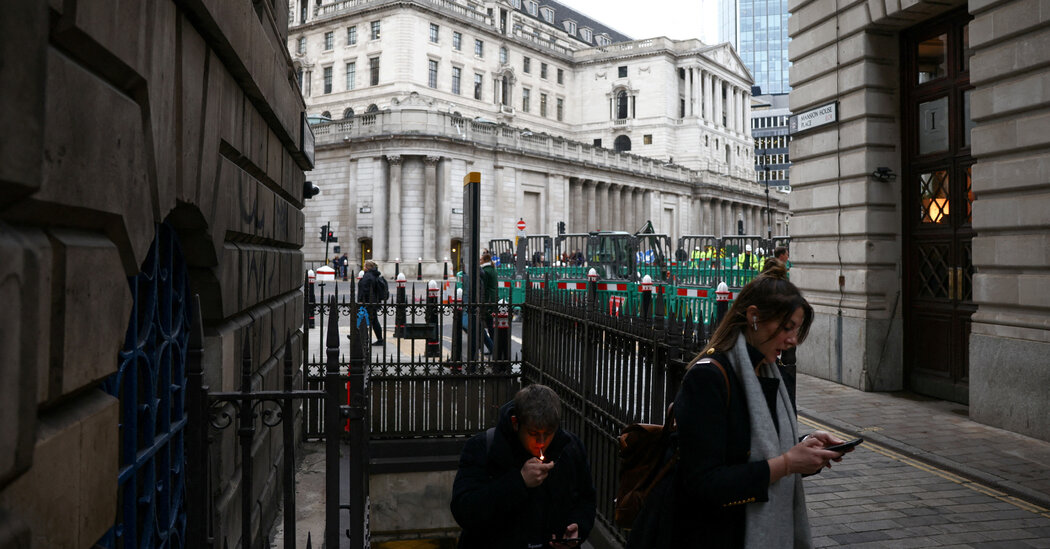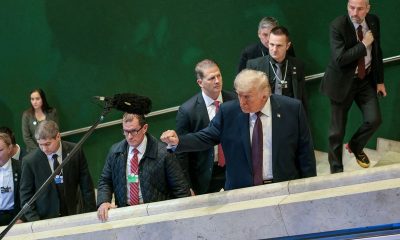Economy
Bank of England hikes rates to 5% in surprise move to tackle stubborn inflation

The Bank of England surprised many investors by raising interest rates half a percentage point on Thursday, saying there had been “significant” news suggesting Britain’s persistently high inflation would take even longer to fall.
The BoE’s Monetary Policy Committee (MPC) voted 7-2 to raise its main interest rate from 4.5% to 5%, the highest since 2008 and its largest increase since February, following stickier inflation and wage growth since policymakers last met in May.
“The economy is doing better than expected but inflation is still too high and we’ve got to deal with it,” said Governor Andrew Bailey, who has been criticised for not acting decisively enough.
“If we don’t raise rates now, it could be worse later.”
Economists polled by Reuters last week had expected a move to 4.75%, although investors had priced in a nearly 50% chance of a rise to 5% following Wednesday’s inflation surprise.
Sterling briefly rose against the U.S. dollar while two-year bond yields climbed. In a sign of worries about a recession, an inversion of the two- to 10-year yield curve deepened to its greatest in more than a decade.
Joseph Little, global chief strategist at HSBC Asset Management, said Britain was in the worst position of major western economies, hit not only by the cost of living crisis but also a shortage of workers and fast-rising wages.
“Inflation pressures show more persistency and more momentum than other western economies, and that forces the Bank into a hawkish corner,” Little said, adding there were concerns that the BoE might have to raise rates as high as 6%.
BoE policymakers had given little indication that a half-point rate increase was under consideration.
“There has been significant upside news in recent data that indicates more persistence in the inflation process,” the MPC said. “Second-round effects in domestic price and wage developments generated by external cost shocks are likely to take longer to unwind than they did to emerge.”
MPC members Silvana Tenreyro and Swati Dhingra opposed raising rates again, saying that much of the impact of past tightening had yet to be felt.
High inflation is also a problem for Prime Minister Rishi Sunak, who has pledged to halve the pace of price growth this year before a national election expected in 2024.
Asked by a reporter if the BoE had not acted decisively enough to halt inflation earlier, Sunak said: “It’s right that the Bank of England takes strong action to bring inflation down”.
Finance minister Jeremy Hunt said the BoE had his full support and “tackling inflation relentlessly must be the immediate priority”.
Bailey has been criticised by some lawmakers from Sunak’s Conservative Party who are worried that the surge in borrowing costs, including for mortgages, will cost them votes.
RATE EXPECTATIONS SURGE
After Thursday’s decision, markets saw a nearly 50% chance that Bank Rate would peak at 6.25% by the end of this year.
Britain’s economy – which was hit by the shock of Brexit as well as the COVID-19 pandemic and the surge in gas prices caused by Russia’s invasion of Ukraine – has dodged a widely expected recession so far in 2023.
But unlike most other big rich economies, output has barely recovered to pre-pandemic levels and growth this year looks set to be a minimal 0.25%, according to the BoE’s forecasts.
Bailey said Thursday’s rate rise was “absolutely imperative” to control inflation. “We’re not expecting, we’re not desiring a recession, but we will do what is necessary to bring inflation down to target,” he said.
He said other countries were suffering too from “a pattern of persistent and rather sticky inflation”.
Last week, the European Central Bank raised rates by a quarter-point to 3.5%, and the Swiss and Norwegian central banks announced increases earlier on Thursday. All signalled there might be more tightening to come.
Bundesbank President Joachim Nagel described inflation as a “very greedy beast” on Wednesday, and the U.S. Federal Reserve Chair Jerome Powell said half a percentage point of further rate rises remained “a pretty good guess”, despite last week’s pause.
Bailey reiterated his view – unpopular with many politicians and trade unions – that current wage growth was unsustainable and he said businesses could not continue to keep raising prices at their current pace.
The BoE retained its previous guidance on future policy, saying further tightening in monetary policy would be required if there was evidence of more persistent pressures.
“The BoE has still made no attempt to set the stage for a pause in the rate hike cycle, which we have now seen from the U.S. Fed,” said Henry Cook, senior economist at Japan’s MUFG.
The BoE said it would keep a close eye on the impact of higher rates on mortgage costs, as well as rising rental costs.
Official figures on Wednesday showed consumer price inflation was unchanged at 8.7% in May – although down from a peak of 11.1% last October – while underlying inflation rose to its highest since 1992.
Last month the central bank forecast that inflation would fall to just over 5% by the end of this year and be below its 2% target in early 2025.
Economy
Russian central bank says it needs months to make sure CPI falling before rate cuts -RBC


© Reuters. Russian Central Bank Governor Elvira Nabiullina attends a news conference in Moscow, Russia June 14, 2019. REUTERS/Shamil Zhumatov/File Photo
MOSCOW (Reuters) – Russia’s central bank will need two to three months to make sure that inflation is steadily declining before taking any decision on interest rate cuts, the bank’s governor Elvira Nabiullina told RBC media on Sunday.
The central bank raised its key interest rate by 100 basis points to 16% earlier in December, hiking for the fifth consecutive meeting in response to stubborn inflation, and suggested that its tightening cycle was nearly over.
Nabiullina said it was not yet clear when exactly the regulator would start cutting rates, however.
“We really need to make sure that inflation is steadily decreasing, that these are not one-off factors that can affect the rate of price growth in a particular month,” she said.
Nabiullina said the bank was taking into account a wide range of indicators but primarily those that “characterize the stability of inflation”.
“This will take two or three months or more – it depends on how much the wide range of indicators that characterize sustainable inflation declines,” she said.
The bank will next convene to set its benchmark rate on Feb. 16.
The governor also said the bank should have started monetary policy tightening earlier than in July, when it embarked on the rate-hiking cycle.
Economy
China identifies second set of projects in $140 billion spending plan


© Reuters. FILE PHOTO: Workers walk past an under-construction area with completed office towers in the background, in Shenzhen’s Qianhai new district, Guangdong province, China August 25, 2023. REUTERS/David Kirton/File Photo
SHANGHAI (Reuters) – China’s top planning body said on Saturday it had identified a second batch of public investment projects, including flood control and disaster relief programmes, under a bond issuance and investment plan announced in October to boost the economy.
With the latest tranche, China has now earmarked more than 800 billion yuan of its 1 trillion yuan ($140 billion) in additional government bond issuance in the fourth quarter, as it focuses on fiscal steps to shore up the flagging economy.
The National Development and Reform Commission (NDRC) said in a statement on Saturday it had identified 9,600 projects with planned investment of more than 560 billion yuan.
China’s economy, the world’s second largest, is struggling to regain its footing post-COVID-19 as policymakers grapple with tepid consumer demand, weak exports, falling foreign investment and a deepening real estate crisis.
The 1 trillion yuan in additional bond issuance will widen China’s 2023 budget deficit ratio to around 3.8 percent from 3 percent, the state-run Xinhua news agency has said.
“Construction of the projects will improve China’s flood control system, emergency response mechanism and disaster relief capabilities, and better protect people’s lives and property, so it is very significant,” the NDRC said.
The agency said it will coordinate with other government bodies to make sure that funds are allocated speedily for investment and that high standards of quality are maintained in project construction.
($1 = 7.1315 renminbi)
Economy
Russian central bank says it needs months to make sure CPI falling before rate cuts -RBC


© Reuters. Russian Central Bank Governor Elvira Nabiullina attends a news conference in Moscow, Russia June 14, 2019. REUTERS/Shamil Zhumatov/File Photo
MOSCOW (Reuters) – Russia’s central bank will need two to three months to make sure that inflation is steadily declining before taking any decision on interest rate cuts, the bank’s governor Elvira Nabiullina told RBC media on Sunday.
The central bank raised its key interest rate by 100 basis points to 16% earlier in December, hiking for the fifth consecutive meeting in response to stubborn inflation, and suggested that its tightening cycle was nearly over.
Nabiullina said it was not yet clear when exactly the regulator would start cutting rates, however.
“We really need to make sure that inflation is steadily decreasing, that these are not one-off factors that can affect the rate of price growth in a particular month,” she said.
Nabiullina said the bank was taking into account a wide range of indicators but primarily those that “characterize the stability of inflation”.
“This will take two or three months or more – it depends on how much the wide range of indicators that characterize sustainable inflation declines,” she said.
The bank will next convene to set its benchmark rate on Feb. 16.
The governor also said the bank should have started monetary policy tightening earlier than in July, when it embarked on the rate-hiking cycle.

 Forex4 years ago
Forex4 years agoForex Today: the dollar is gaining strength amid gloomy sentiment at the start of the Fed’s week

 Forex3 years ago
Forex3 years agoUnbiased review of Pocket Option broker

 Forex3 years ago
Forex3 years agoDollar to pound sterling exchange rate today: Pound plummeted to its lowest since 1985

 Forex3 years ago
Forex3 years agoHow is the Australian dollar doing today?

 Cryptocurrency3 years ago
Cryptocurrency3 years agoWhat happened in the crypto market – current events today

 World3 years ago
World3 years agoWhy are modern video games an art form?

 Commodities3 years ago
Commodities3 years agoCopper continues to fall in price on expectations of lower demand in China

 Economy3 years ago
Economy3 years agoCrude oil tankers double in price due to EU anti-Russian sanctions























